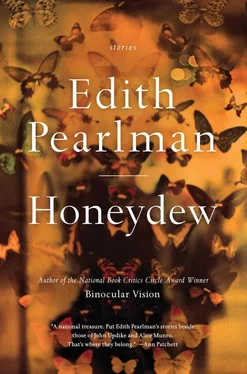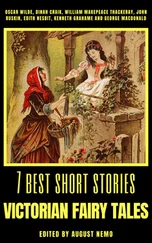“Tell her what?” Frieda said at last.
“To peddle her vapors elsewhere,” Amanda said triumphantly.
“Mandy!” shouted Ben.
She appeared in the bedroom doorway, curly-haired and ardent. Her T-shirt said AUTEUR.
“Please stop feeding nonsense to poor Frieda,” said Ben. “What will she think?”
Amanda joined him on the bed and lay on her side, propped on an elbow. “She’ll discount the nonsense and think what she already thinks. That we’re libertines.”
“Ah. And are we that?”
“I don’t know. What are we, Benjy?”
Ben considered the question. He himself — dark, thickset, Brooklyn-born — was a respectful sort of person. He particularly respected Amanda, whose upright Maine family he also respected. Once, years ago, he had loved her older sister, presently married. Now he loved Amanda, but in a casual way. And impudent Amanda — what was she? At the least, an excellent student of literature. He wished that the college kids he taught were as clever.
“I am a conformist,” he said, illustrating his words by curving his hand around her breast. She giggled. He muzzled the Auteur, then put his chin into her curls and noticed that her double stood in the doorway. Frieda’s T-shirt read GODOLPHIN HIGH, CLASS OF ’82. “But, Frieda, you don’t even live in Godolphin,” Ben remarked across Amanda’s head.
“The shirt belongs to my cousin,” Frieda said with her usual blush.
Godolphin was the town — really a wedge of Boston — in which Ben, who worked in New York, and Amanda, who went to school in Pennsylvania, had elected to spend the summer. They had sublet a snug apartment at the top of a three-decker house. On the first floor lived an old couple, and on the second lived Frieda’s aunt, Rennie, a young divorcée with a son at camp. This aunt exhausted herself day and night in her antiques store. Frieda herself was a child of Manhattan. Her parents, both art historians, were spending their summer in Italy, and Frieda had chosen Godolphin over Florence’s I Tatti.
“Your cousin would not recognize his garment,” Ben said gravely to Frieda.
Amanda was on her feet again. “Come into the kitchen with us, Ben,” she said agreeably. “Have you been asleep all afternoon?”
Ben got out of bed. “I’ll be with you in a minute.”
He used the bathroom, then paused in the dining room. He and Amanda were in the habit of eating at the round table in the kitchen and reserving the heavy oak table in the dining room for work. Their two typewriters, one at either end, looked like combatants. Each machine was surrounded by papers and books, Ben’s piles orderly, Amanda’s in disarray. Though he had no intention of working at this hour, Ben sat down in front of his typewriter in order to groan.
Frieda had an affinity for jambs. Now she stood aslant between the kitchen and dining room. “What are you writing about?”
“Hawthorne,” he said. “The first novel,” he expanded. “Name of Fanshawe, ” he summed up.
She waited for a while. “Oh,” she said. “I haven’t read any Hawthorne.”
“Do so soon.”
“ Fanshawe. A book of Gothic posturing,” Amanda called from the kitchen. “But the setting is excellent. And there are a couple of more or less comic characters. I find Hawthorne a not-bad writer.”
“Hawthorne is grateful,” Ben muttered.
“What are you going to say about Fanshawe ?” asked Frieda.
“I wish I could tell you,” Ben said. In truth he wished he knew. “But reticence is essential to the scholar. Ideas have to be nurtured in the dark silence of the mind before they can live in the bright light of discourse. When they can bear your intelligent scrutiny I will reveal them.” He went on in this vein for some time, unable to stop. Finally Amanda called him to dinner.
“Will you stay, Frieda?” she said with her beautiful smile. “Your aunt’s at the store tonight.”
Frieda did not have to be asked twice.
In the kitchen hung some plant that had been in beautiful condition a few weeks ago. The framed squares of needlepoint on the walls were the work of Mrs. Cunningham, from whom, through the proxy of Frieda’s aunt, Ben and Amanda had subrented the apartment. Mr. and Mrs. Cunningham, both schoolteachers, had gone to Iowa for the summer.
“What are the Cunninghams like?” Amanda asked as she served the tuna fish salad.
“I arrived only a week before they left,” Frieda said cautiously.
“Tell us your impressions.”
Frieda cleared her throat. “Clean and tidy and traditional.”
“All of those china cats in the living room,” Ben agreed. He helped himself to a carrot. “Couldn’t you have scraped this, Amanda? When it’s my turn to do dinner I always scrape the carrots.”
“I forgot.”
“I never forget.”
“But you often forget to flush the toilet,” she reminded him sweetly.
Ben addressed Frieda. “The Cunninghams, I am persuaded, never argue—”
“I don’t know.”
“—for she has her needlepoint, and he has his Time. Such mutuality. Theirs is a marriage of two minds. Did you remember to pick up some strawberries, Amanda?”
“Have a pickle,” Amanda said. “Mutuality is exactly the point I was trying to clarify last night. Mutuality isn’t the least bit important in marriage, Ben. It counts only in romance. Marriage has no truck with the smarmy mutual gratification that you just attempted to extol by sarcastic, by sarcastic…”
“Implication?”
“Implication. The idea in my article, ‘Connubis,’ is that—”
“Will the idea bear scrutiny?” Frieda asked. “Will it live in the light of day?”
“Of course I’m beginning to realize that conventional wisdom about the reasons for marriage is out-of-date. Like most conventional wisdom. People do not marry for security anymore. Security is provided by the welfare state.”
“But we live under capitalism,” Frieda said.
“Maybe you do at the Brearley School. The rest of the country is on welfare. In some form. Where was I? Oh yes, security. Security is out. And people don’t marry for status either, because marriage no longer confers it. Nor do they marry for sexual satisfaction, because anybody can attain that at any time—”
“I hadn’t noticed,” said Ben, looking hard at her.
“—as easily single as wed,” she blandly went on.
“So why should a person get married?” Frieda asked.
Amanda considered the question. Ben meanwhile thought of Hawthorne’s wedded contentment.
Finally Amanda answered, “There are two creditable reasons to get married. Financial and dynastic.”
“Financial?” Frieda said. “You told me we were already secure.”
“Secure isn’t prosperous.”
“Dynastic?” Ben wondered.
Amanda turned on him one of her shining gazes. “Think of it! To raise a family a couple need not be passionate. They need not even be compatible.”
“Need they be of different sexes?” Ben asked.
She waved an impatient hand. “They must be, as a pair, complete. Whatever they want for themselves and their progeny has to be provided by one or the other. If my family has influence, yours had better have cash. If I am worldly-wise, you had better be empathetic—”
“Empathic,” Ben said.
“—and so on. We choose each other on the basis of the needs of the future family rather than on our personal desires. Those we satisfy elsewhere…the mariage de convenance! That’s it, in a word.”
“In a phrase,” Ben corrected. “The old mariage de convenance had nothing to do with love.”
“Neither will the new,” Amanda said.
Ben gave his pretty paramour a long look. Did she believe this stuff? Or were she and her sidekick playing some deep, female game? He knew he would not marry her. He was proud of her, and he enjoyed her company, but she was not what he had in mind as a lifetime partner.
Читать дальше












